Sustainable Tourism Development and Planning
VerifiedAdded on 2020/10/05
|12
|3395
|176
AI Summary
This assignment requires students to analyze the importance of sustainable tourism development and planning in destinations. It involves resolving conflicts associated with tourism development, implementing multi-stakeholder approaches, and supporting innovation for tourism development. The assignment also covers topics such as destination crisis management, product diversification, and environmental sustainability, making it a comprehensive study on sustainable tourism management solutions.
Contribute Materials
Your contribution can guide someone’s learning journey. Share your
documents today.
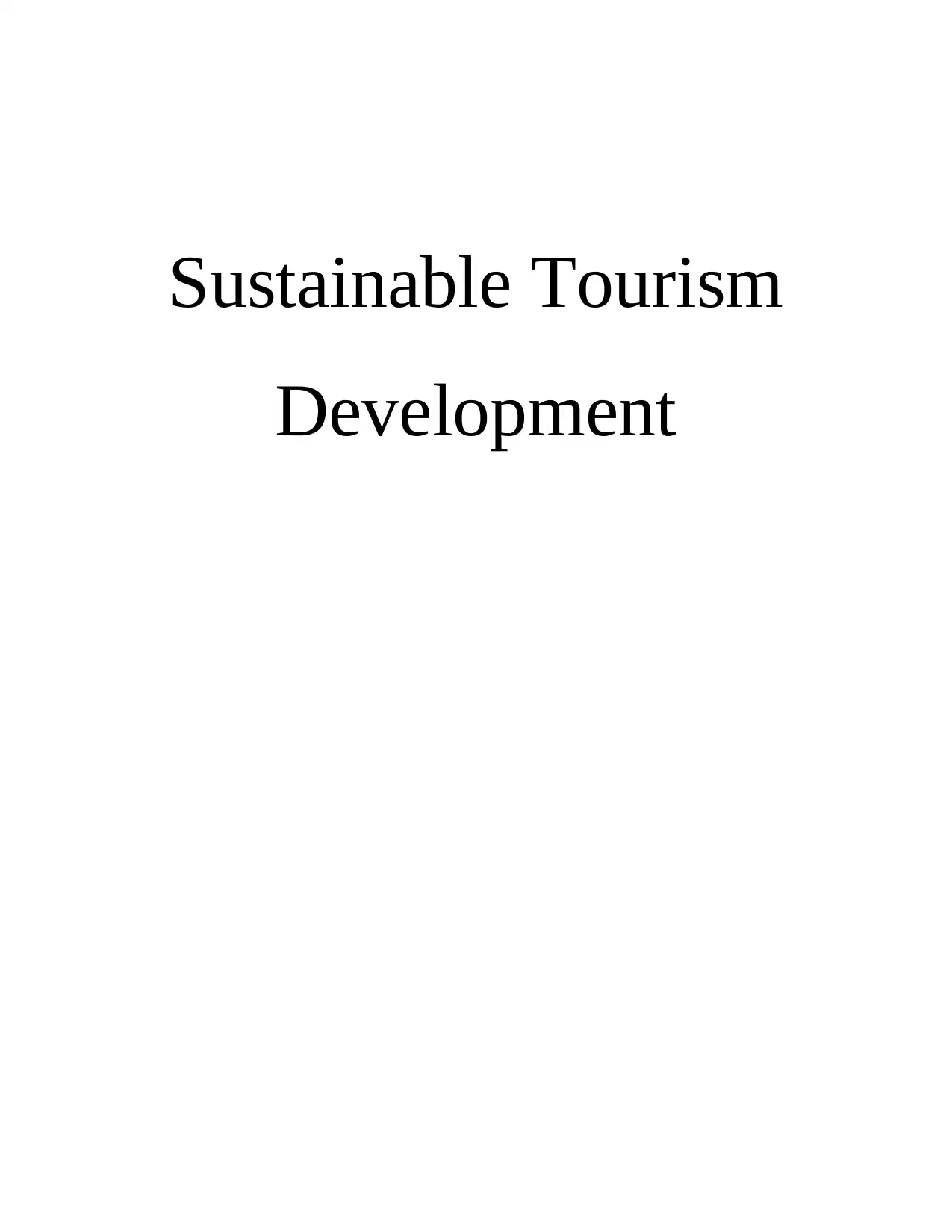
Sustainable Tourism
Development
Development
Secure Best Marks with AI Grader
Need help grading? Try our AI Grader for instant feedback on your assignments.
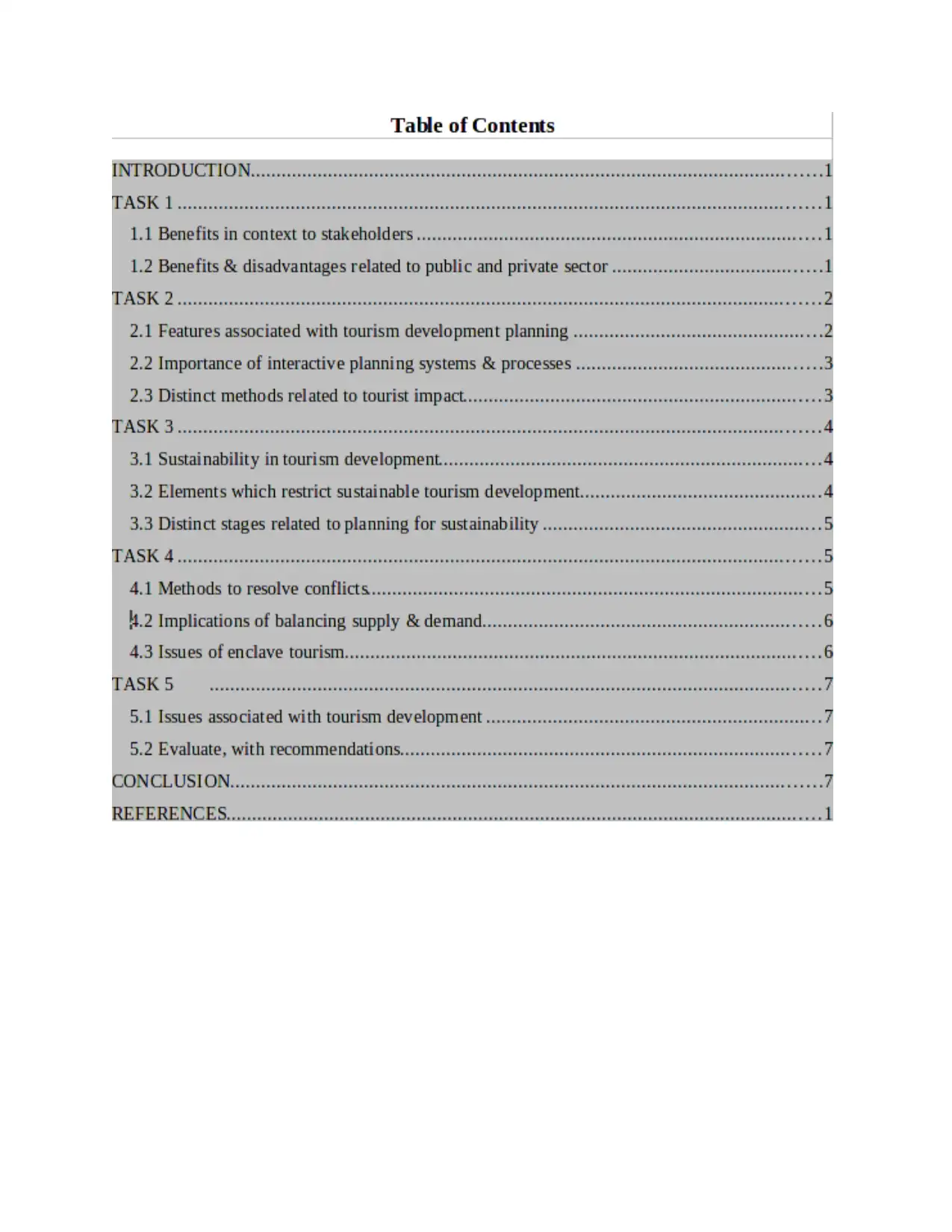
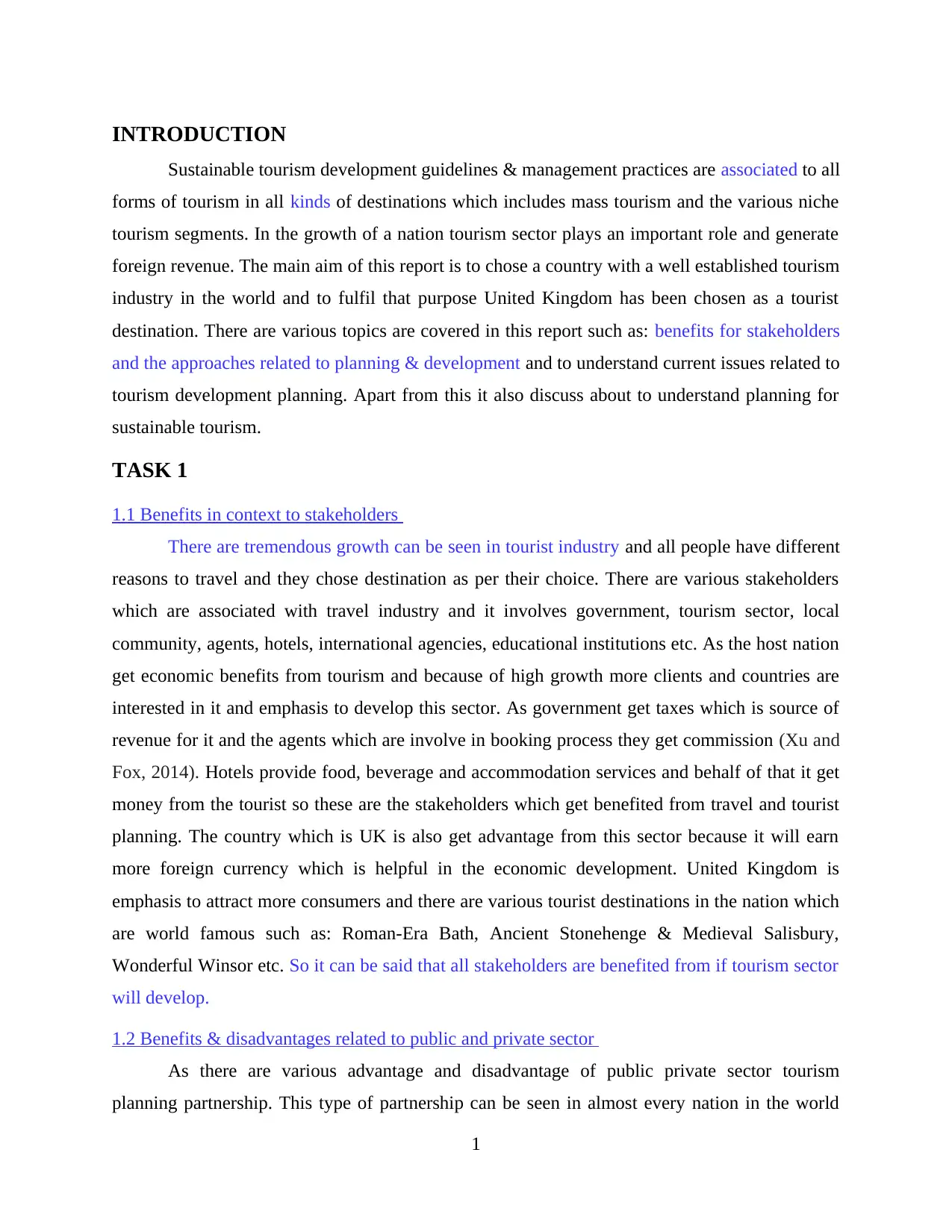
INTRODUCTION
Sustainable tourism development guidelines & management practices are associated to all
forms of tourism in all kinds of destinations which includes mass tourism and the various niche
tourism segments. In the growth of a nation tourism sector plays an important role and generate
foreign revenue. The main aim of this report is to chose a country with a well established tourism
industry in the world and to fulfil that purpose United Kingdom has been chosen as a tourist
destination. There are various topics are covered in this report such as: benefits for stakeholders
and the approaches related to planning & development and to understand current issues related to
tourism development planning. Apart from this it also discuss about to understand planning for
sustainable tourism.
TASK 1
1.1 Benefits in context to stakeholders
There are tremendous growth can be seen in tourist industry and all people have different
reasons to travel and they chose destination as per their choice. There are various stakeholders
which are associated with travel industry and it involves government, tourism sector, local
community, agents, hotels, international agencies, educational institutions etc. As the host nation
get economic benefits from tourism and because of high growth more clients and countries are
interested in it and emphasis to develop this sector. As government get taxes which is source of
revenue for it and the agents which are involve in booking process they get commission (Xu and
Fox, 2014). Hotels provide food, beverage and accommodation services and behalf of that it get
money from the tourist so these are the stakeholders which get benefited from travel and tourist
planning. The country which is UK is also get advantage from this sector because it will earn
more foreign currency which is helpful in the economic development. United Kingdom is
emphasis to attract more consumers and there are various tourist destinations in the nation which
are world famous such as: Roman-Era Bath, Ancient Stonehenge & Medieval Salisbury,
Wonderful Winsor etc. So it can be said that all stakeholders are benefited from if tourism sector
will develop.
1.2 Benefits & disadvantages related to public and private sector
As there are various advantage and disadvantage of public private sector tourism
planning partnership. This type of partnership can be seen in almost every nation in the world
1
Sustainable tourism development guidelines & management practices are associated to all
forms of tourism in all kinds of destinations which includes mass tourism and the various niche
tourism segments. In the growth of a nation tourism sector plays an important role and generate
foreign revenue. The main aim of this report is to chose a country with a well established tourism
industry in the world and to fulfil that purpose United Kingdom has been chosen as a tourist
destination. There are various topics are covered in this report such as: benefits for stakeholders
and the approaches related to planning & development and to understand current issues related to
tourism development planning. Apart from this it also discuss about to understand planning for
sustainable tourism.
TASK 1
1.1 Benefits in context to stakeholders
There are tremendous growth can be seen in tourist industry and all people have different
reasons to travel and they chose destination as per their choice. There are various stakeholders
which are associated with travel industry and it involves government, tourism sector, local
community, agents, hotels, international agencies, educational institutions etc. As the host nation
get economic benefits from tourism and because of high growth more clients and countries are
interested in it and emphasis to develop this sector. As government get taxes which is source of
revenue for it and the agents which are involve in booking process they get commission (Xu and
Fox, 2014). Hotels provide food, beverage and accommodation services and behalf of that it get
money from the tourist so these are the stakeholders which get benefited from travel and tourist
planning. The country which is UK is also get advantage from this sector because it will earn
more foreign currency which is helpful in the economic development. United Kingdom is
emphasis to attract more consumers and there are various tourist destinations in the nation which
are world famous such as: Roman-Era Bath, Ancient Stonehenge & Medieval Salisbury,
Wonderful Winsor etc. So it can be said that all stakeholders are benefited from if tourism sector
will develop.
1.2 Benefits & disadvantages related to public and private sector
As there are various advantage and disadvantage of public private sector tourism
planning partnership. This type of partnership can be seen in almost every nation in the world
1
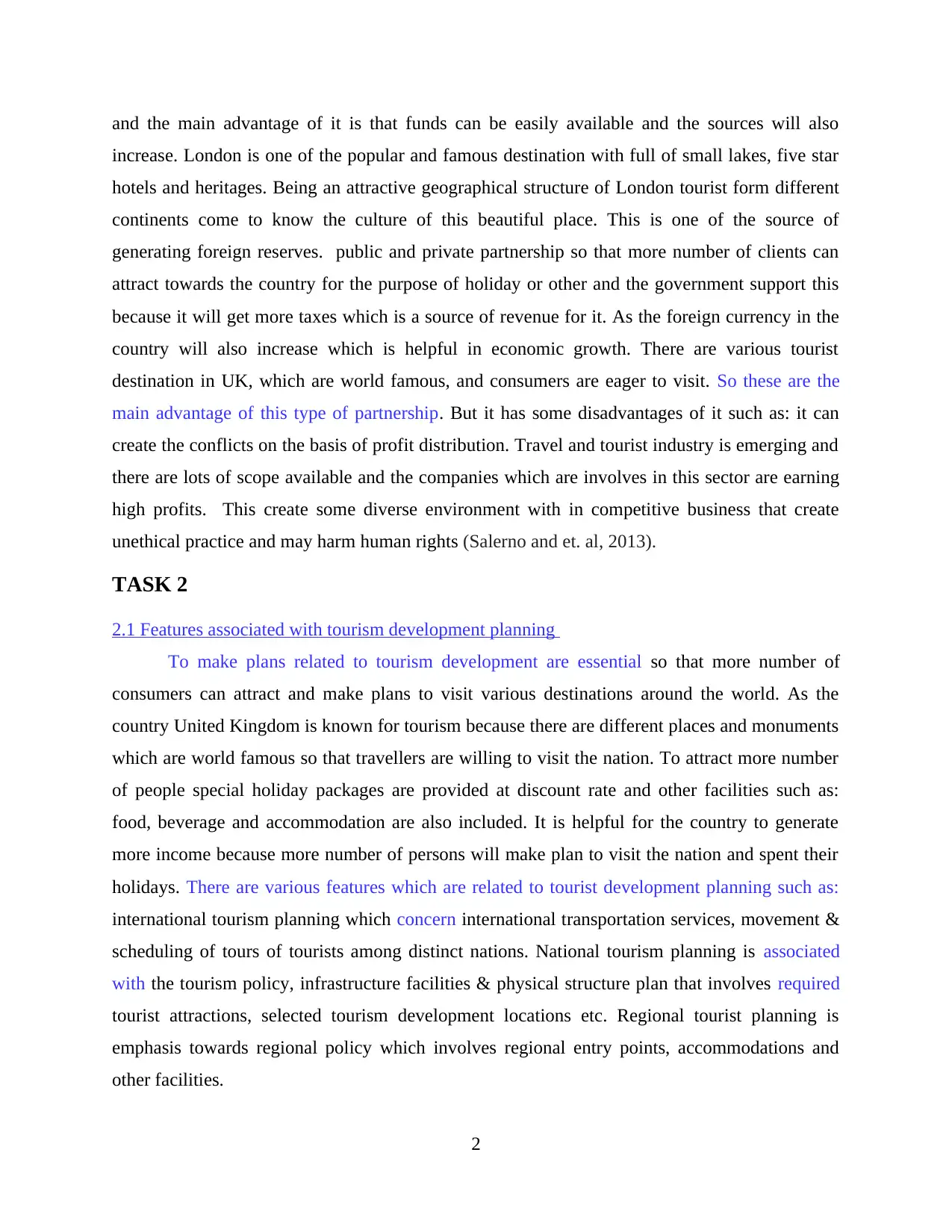
and the main advantage of it is that funds can be easily available and the sources will also
increase. London is one of the popular and famous destination with full of small lakes, five star
hotels and heritages. Being an attractive geographical structure of London tourist form different
continents come to know the culture of this beautiful place. This is one of the source of
generating foreign reserves. public and private partnership so that more number of clients can
attract towards the country for the purpose of holiday or other and the government support this
because it will get more taxes which is a source of revenue for it. As the foreign currency in the
country will also increase which is helpful in economic growth. There are various tourist
destination in UK, which are world famous, and consumers are eager to visit. So these are the
main advantage of this type of partnership. But it has some disadvantages of it such as: it can
create the conflicts on the basis of profit distribution. Travel and tourist industry is emerging and
there are lots of scope available and the companies which are involves in this sector are earning
high profits. This create some diverse environment with in competitive business that create
unethical practice and may harm human rights (Salerno and et. al, 2013).
TASK 2
2.1 Features associated with tourism development planning
To make plans related to tourism development are essential so that more number of
consumers can attract and make plans to visit various destinations around the world. As the
country United Kingdom is known for tourism because there are different places and monuments
which are world famous so that travellers are willing to visit the nation. To attract more number
of people special holiday packages are provided at discount rate and other facilities such as:
food, beverage and accommodation are also included. It is helpful for the country to generate
more income because more number of persons will make plan to visit the nation and spent their
holidays. There are various features which are related to tourist development planning such as:
international tourism planning which concern international transportation services, movement &
scheduling of tours of tourists among distinct nations. National tourism planning is associated
with the tourism policy, infrastructure facilities & physical structure plan that involves required
tourist attractions, selected tourism development locations etc. Regional tourist planning is
emphasis towards regional policy which involves regional entry points, accommodations and
other facilities.
2
increase. London is one of the popular and famous destination with full of small lakes, five star
hotels and heritages. Being an attractive geographical structure of London tourist form different
continents come to know the culture of this beautiful place. This is one of the source of
generating foreign reserves. public and private partnership so that more number of clients can
attract towards the country for the purpose of holiday or other and the government support this
because it will get more taxes which is a source of revenue for it. As the foreign currency in the
country will also increase which is helpful in economic growth. There are various tourist
destination in UK, which are world famous, and consumers are eager to visit. So these are the
main advantage of this type of partnership. But it has some disadvantages of it such as: it can
create the conflicts on the basis of profit distribution. Travel and tourist industry is emerging and
there are lots of scope available and the companies which are involves in this sector are earning
high profits. This create some diverse environment with in competitive business that create
unethical practice and may harm human rights (Salerno and et. al, 2013).
TASK 2
2.1 Features associated with tourism development planning
To make plans related to tourism development are essential so that more number of
consumers can attract and make plans to visit various destinations around the world. As the
country United Kingdom is known for tourism because there are different places and monuments
which are world famous so that travellers are willing to visit the nation. To attract more number
of people special holiday packages are provided at discount rate and other facilities such as:
food, beverage and accommodation are also included. It is helpful for the country to generate
more income because more number of persons will make plan to visit the nation and spent their
holidays. There are various features which are related to tourist development planning such as:
international tourism planning which concern international transportation services, movement &
scheduling of tours of tourists among distinct nations. National tourism planning is associated
with the tourism policy, infrastructure facilities & physical structure plan that involves required
tourist attractions, selected tourism development locations etc. Regional tourist planning is
emphasis towards regional policy which involves regional entry points, accommodations and
other facilities.
2
Secure Best Marks with AI Grader
Need help grading? Try our AI Grader for instant feedback on your assignments.
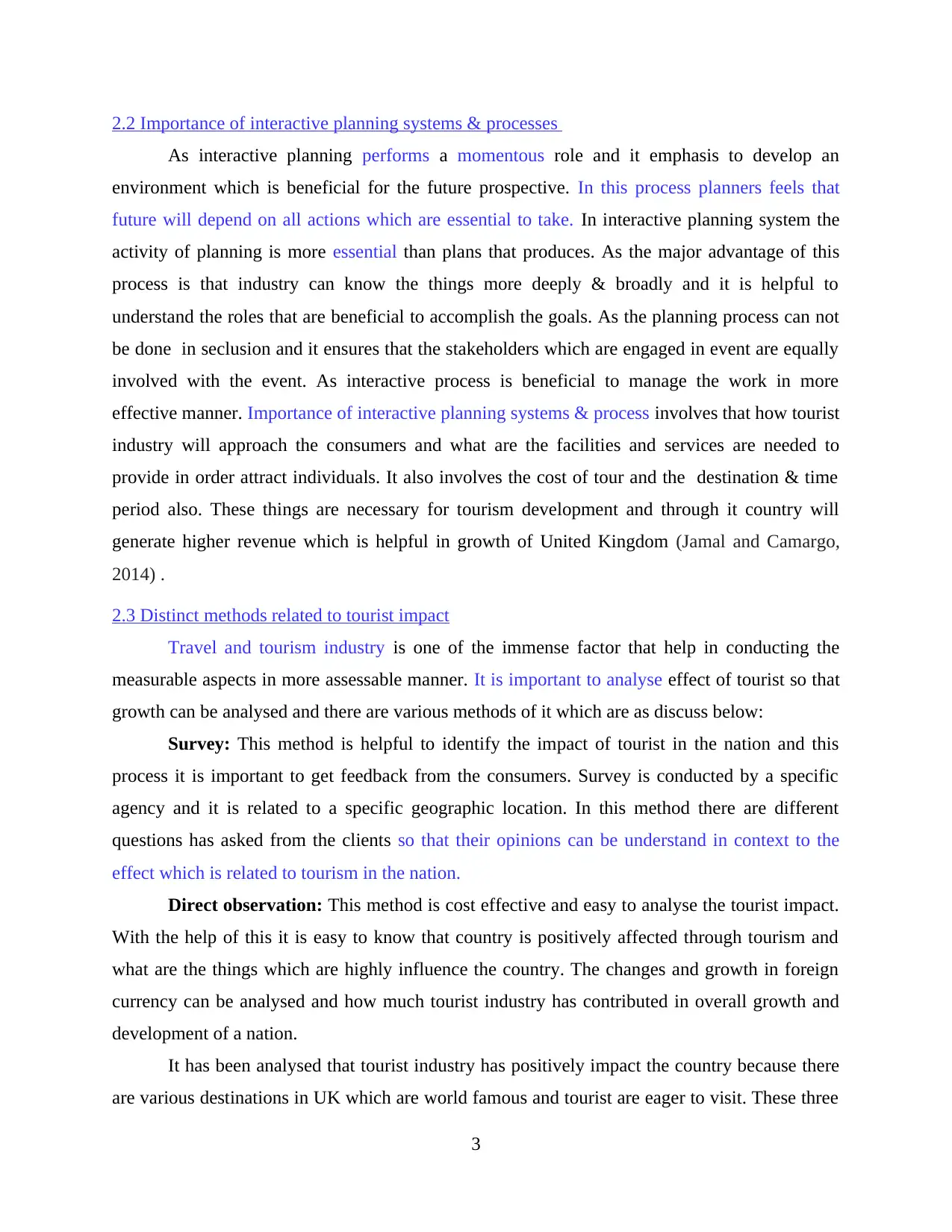
2.2 Importance of interactive planning systems & processes
As interactive planning performs a momentous role and it emphasis to develop an
environment which is beneficial for the future prospective. In this process planners feels that
future will depend on all actions which are essential to take. In interactive planning system the
activity of planning is more essential than plans that produces. As the major advantage of this
process is that industry can know the things more deeply & broadly and it is helpful to
understand the roles that are beneficial to accomplish the goals. As the planning process can not
be done in seclusion and it ensures that the stakeholders which are engaged in event are equally
involved with the event. As interactive process is beneficial to manage the work in more
effective manner. Importance of interactive planning systems & process involves that how tourist
industry will approach the consumers and what are the facilities and services are needed to
provide in order attract individuals. It also involves the cost of tour and the destination & time
period also. These things are necessary for tourism development and through it country will
generate higher revenue which is helpful in growth of United Kingdom (Jamal and Camargo,
2014) .
2.3 Distinct methods related to tourist impact
Travel and tourism industry is one of the immense factor that help in conducting the
measurable aspects in more assessable manner. It is important to analyse effect of tourist so that
growth can be analysed and there are various methods of it which are as discuss below:
Survey: This method is helpful to identify the impact of tourist in the nation and this
process it is important to get feedback from the consumers. Survey is conducted by a specific
agency and it is related to a specific geographic location. In this method there are different
questions has asked from the clients so that their opinions can be understand in context to the
effect which is related to tourism in the nation.
Direct observation: This method is cost effective and easy to analyse the tourist impact.
With the help of this it is easy to know that country is positively affected through tourism and
what are the things which are highly influence the country. The changes and growth in foreign
currency can be analysed and how much tourist industry has contributed in overall growth and
development of a nation.
It has been analysed that tourist industry has positively impact the country because there
are various destinations in UK which are world famous and tourist are eager to visit. These three
3
As interactive planning performs a momentous role and it emphasis to develop an
environment which is beneficial for the future prospective. In this process planners feels that
future will depend on all actions which are essential to take. In interactive planning system the
activity of planning is more essential than plans that produces. As the major advantage of this
process is that industry can know the things more deeply & broadly and it is helpful to
understand the roles that are beneficial to accomplish the goals. As the planning process can not
be done in seclusion and it ensures that the stakeholders which are engaged in event are equally
involved with the event. As interactive process is beneficial to manage the work in more
effective manner. Importance of interactive planning systems & process involves that how tourist
industry will approach the consumers and what are the facilities and services are needed to
provide in order attract individuals. It also involves the cost of tour and the destination & time
period also. These things are necessary for tourism development and through it country will
generate higher revenue which is helpful in growth of United Kingdom (Jamal and Camargo,
2014) .
2.3 Distinct methods related to tourist impact
Travel and tourism industry is one of the immense factor that help in conducting the
measurable aspects in more assessable manner. It is important to analyse effect of tourist so that
growth can be analysed and there are various methods of it which are as discuss below:
Survey: This method is helpful to identify the impact of tourist in the nation and this
process it is important to get feedback from the consumers. Survey is conducted by a specific
agency and it is related to a specific geographic location. In this method there are different
questions has asked from the clients so that their opinions can be understand in context to the
effect which is related to tourism in the nation.
Direct observation: This method is cost effective and easy to analyse the tourist impact.
With the help of this it is easy to know that country is positively affected through tourism and
what are the things which are highly influence the country. The changes and growth in foreign
currency can be analysed and how much tourist industry has contributed in overall growth and
development of a nation.
It has been analysed that tourist industry has positively impact the country because there
are various destinations in UK which are world famous and tourist are eager to visit. These three
3
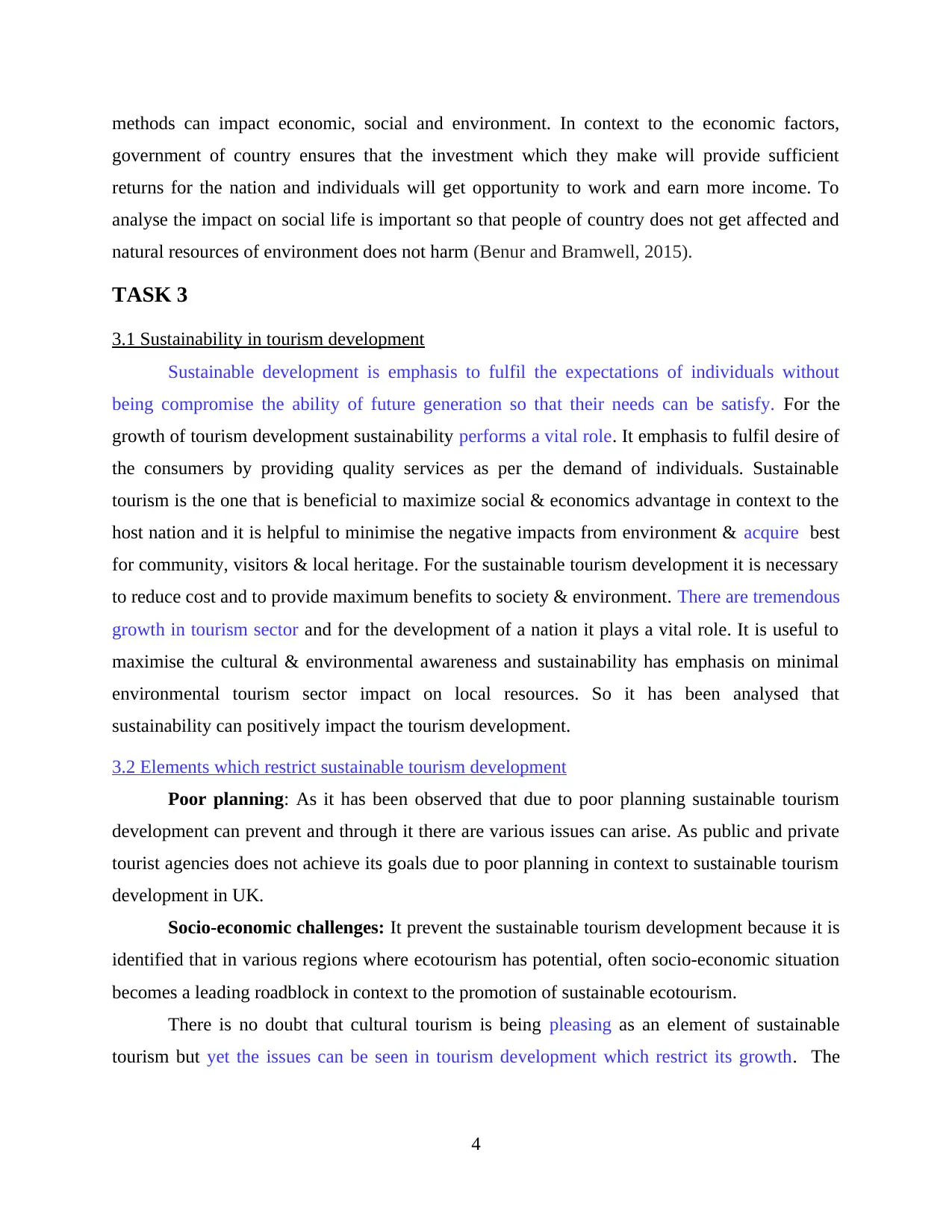
methods can impact economic, social and environment. In context to the economic factors,
government of country ensures that the investment which they make will provide sufficient
returns for the nation and individuals will get opportunity to work and earn more income. To
analyse the impact on social life is important so that people of country does not get affected and
natural resources of environment does not harm (Benur and Bramwell, 2015).
TASK 3
3.1 Sustainability in tourism development
Sustainable development is emphasis to fulfil the expectations of individuals without
being compromise the ability of future generation so that their needs can be satisfy. For the
growth of tourism development sustainability performs a vital role. It emphasis to fulfil desire of
the consumers by providing quality services as per the demand of individuals. Sustainable
tourism is the one that is beneficial to maximize social & economics advantage in context to the
host nation and it is helpful to minimise the negative impacts from environment & acquire best
for community, visitors & local heritage. For the sustainable tourism development it is necessary
to reduce cost and to provide maximum benefits to society & environment. There are tremendous
growth in tourism sector and for the development of a nation it plays a vital role. It is useful to
maximise the cultural & environmental awareness and sustainability has emphasis on minimal
environmental tourism sector impact on local resources. So it has been analysed that
sustainability can positively impact the tourism development.
3.2 Elements which restrict sustainable tourism development
Poor planning: As it has been observed that due to poor planning sustainable tourism
development can prevent and through it there are various issues can arise. As public and private
tourist agencies does not achieve its goals due to poor planning in context to sustainable tourism
development in UK.
Socio-economic challenges: It prevent the sustainable tourism development because it is
identified that in various regions where ecotourism has potential, often socio-economic situation
becomes a leading roadblock in context to the promotion of sustainable ecotourism.
There is no doubt that cultural tourism is being pleasing as an element of sustainable
tourism but yet the issues can be seen in tourism development which restrict its growth. The
4
government of country ensures that the investment which they make will provide sufficient
returns for the nation and individuals will get opportunity to work and earn more income. To
analyse the impact on social life is important so that people of country does not get affected and
natural resources of environment does not harm (Benur and Bramwell, 2015).
TASK 3
3.1 Sustainability in tourism development
Sustainable development is emphasis to fulfil the expectations of individuals without
being compromise the ability of future generation so that their needs can be satisfy. For the
growth of tourism development sustainability performs a vital role. It emphasis to fulfil desire of
the consumers by providing quality services as per the demand of individuals. Sustainable
tourism is the one that is beneficial to maximize social & economics advantage in context to the
host nation and it is helpful to minimise the negative impacts from environment & acquire best
for community, visitors & local heritage. For the sustainable tourism development it is necessary
to reduce cost and to provide maximum benefits to society & environment. There are tremendous
growth in tourism sector and for the development of a nation it plays a vital role. It is useful to
maximise the cultural & environmental awareness and sustainability has emphasis on minimal
environmental tourism sector impact on local resources. So it has been analysed that
sustainability can positively impact the tourism development.
3.2 Elements which restrict sustainable tourism development
Poor planning: As it has been observed that due to poor planning sustainable tourism
development can prevent and through it there are various issues can arise. As public and private
tourist agencies does not achieve its goals due to poor planning in context to sustainable tourism
development in UK.
Socio-economic challenges: It prevent the sustainable tourism development because it is
identified that in various regions where ecotourism has potential, often socio-economic situation
becomes a leading roadblock in context to the promotion of sustainable ecotourism.
There is no doubt that cultural tourism is being pleasing as an element of sustainable
tourism but yet the issues can be seen in tourism development which restrict its growth. The
4
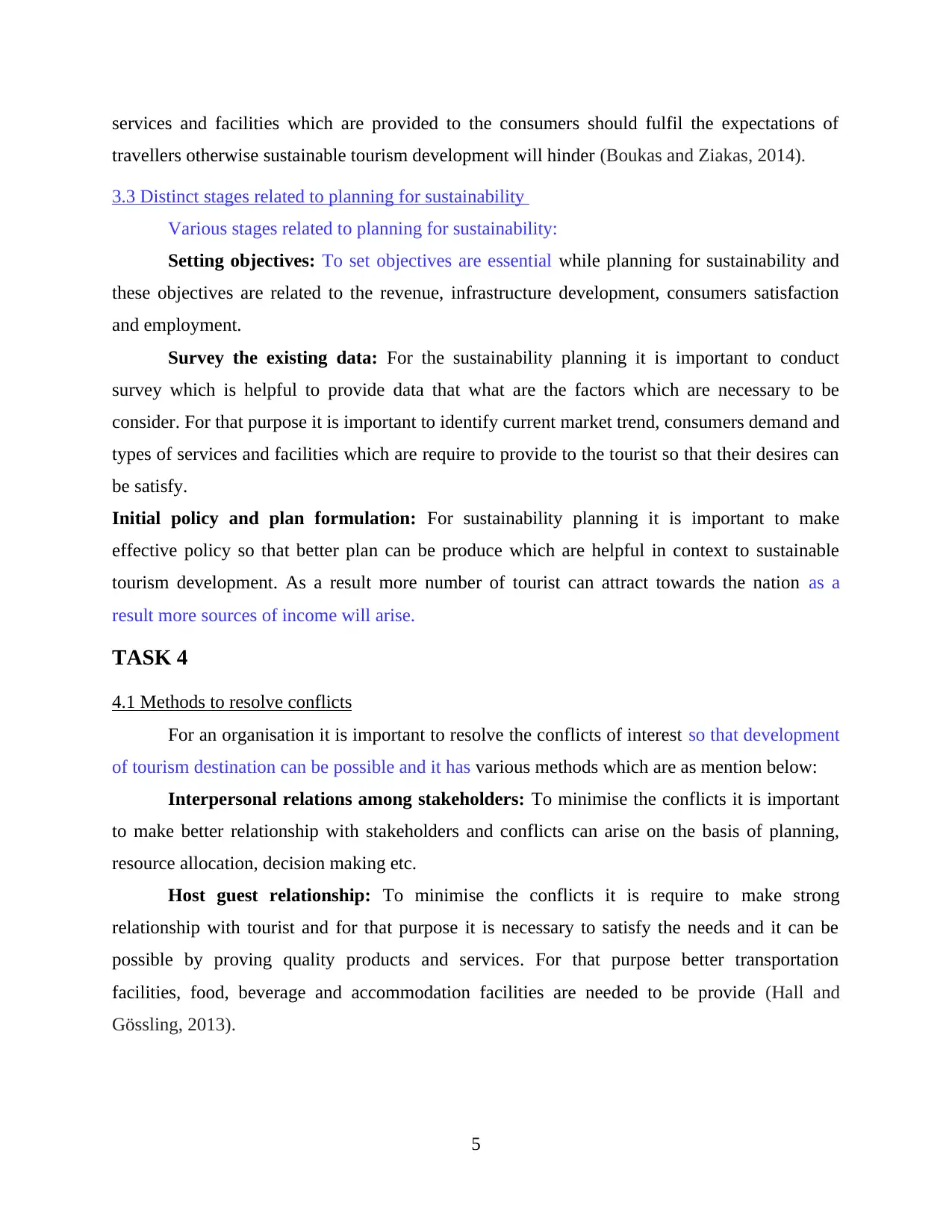
services and facilities which are provided to the consumers should fulfil the expectations of
travellers otherwise sustainable tourism development will hinder (Boukas and Ziakas, 2014).
3.3 Distinct stages related to planning for sustainability
Various stages related to planning for sustainability:
Setting objectives: To set objectives are essential while planning for sustainability and
these objectives are related to the revenue, infrastructure development, consumers satisfaction
and employment.
Survey the existing data: For the sustainability planning it is important to conduct
survey which is helpful to provide data that what are the factors which are necessary to be
consider. For that purpose it is important to identify current market trend, consumers demand and
types of services and facilities which are require to provide to the tourist so that their desires can
be satisfy.
Initial policy and plan formulation: For sustainability planning it is important to make
effective policy so that better plan can be produce which are helpful in context to sustainable
tourism development. As a result more number of tourist can attract towards the nation as a
result more sources of income will arise.
TASK 4
4.1 Methods to resolve conflicts
For an organisation it is important to resolve the conflicts of interest so that development
of tourism destination can be possible and it has various methods which are as mention below:
Interpersonal relations among stakeholders: To minimise the conflicts it is important
to make better relationship with stakeholders and conflicts can arise on the basis of planning,
resource allocation, decision making etc.
Host guest relationship: To minimise the conflicts it is require to make strong
relationship with tourist and for that purpose it is necessary to satisfy the needs and it can be
possible by proving quality products and services. For that purpose better transportation
facilities, food, beverage and accommodation facilities are needed to be provide (Hall and
Gössling, 2013).
5
travellers otherwise sustainable tourism development will hinder (Boukas and Ziakas, 2014).
3.3 Distinct stages related to planning for sustainability
Various stages related to planning for sustainability:
Setting objectives: To set objectives are essential while planning for sustainability and
these objectives are related to the revenue, infrastructure development, consumers satisfaction
and employment.
Survey the existing data: For the sustainability planning it is important to conduct
survey which is helpful to provide data that what are the factors which are necessary to be
consider. For that purpose it is important to identify current market trend, consumers demand and
types of services and facilities which are require to provide to the tourist so that their desires can
be satisfy.
Initial policy and plan formulation: For sustainability planning it is important to make
effective policy so that better plan can be produce which are helpful in context to sustainable
tourism development. As a result more number of tourist can attract towards the nation as a
result more sources of income will arise.
TASK 4
4.1 Methods to resolve conflicts
For an organisation it is important to resolve the conflicts of interest so that development
of tourism destination can be possible and it has various methods which are as mention below:
Interpersonal relations among stakeholders: To minimise the conflicts it is important
to make better relationship with stakeholders and conflicts can arise on the basis of planning,
resource allocation, decision making etc.
Host guest relationship: To minimise the conflicts it is require to make strong
relationship with tourist and for that purpose it is necessary to satisfy the needs and it can be
possible by proving quality products and services. For that purpose better transportation
facilities, food, beverage and accommodation facilities are needed to be provide (Hall and
Gössling, 2013).
5
Paraphrase This Document
Need a fresh take? Get an instant paraphrase of this document with our AI Paraphraser
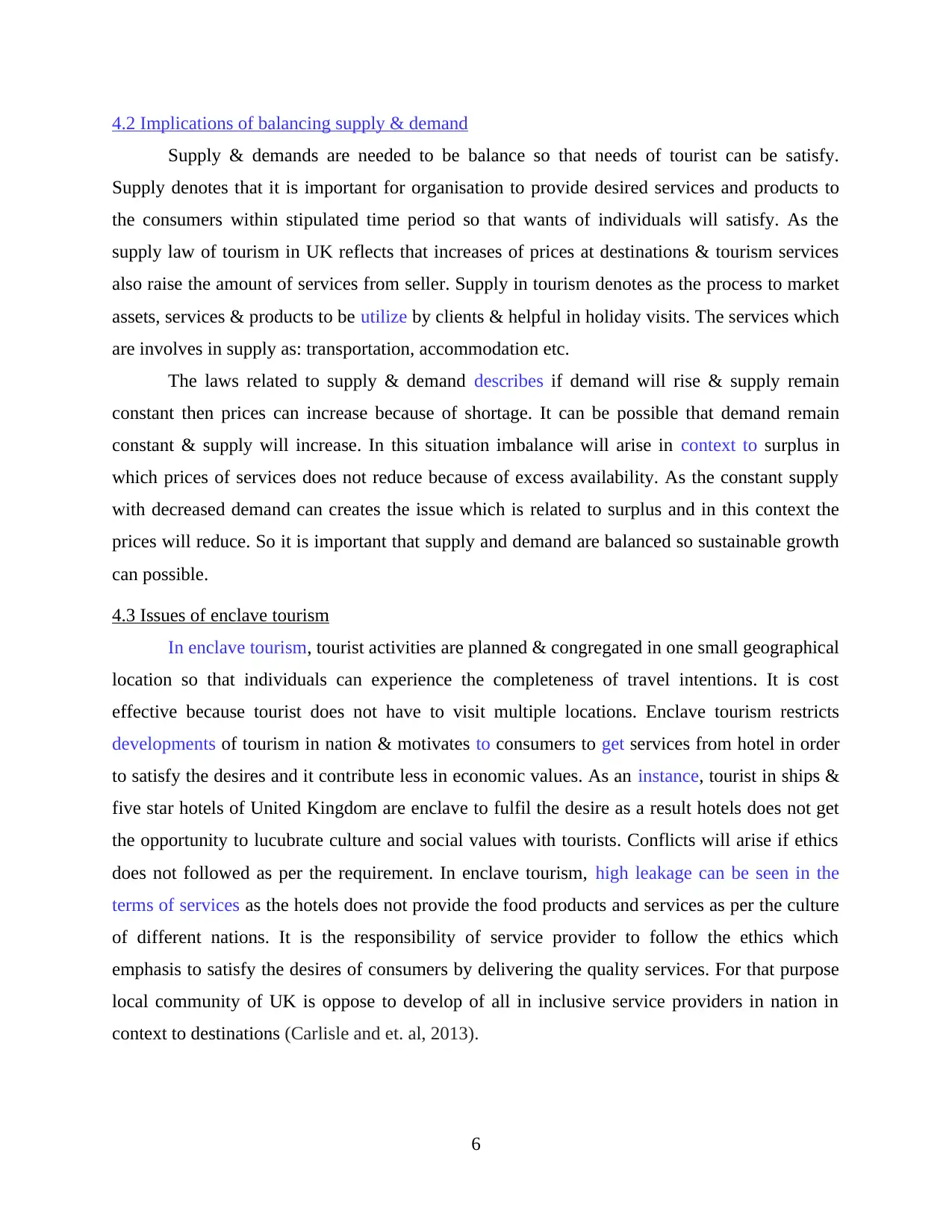
4.2 Implications of balancing supply & demand
Supply & demands are needed to be balance so that needs of tourist can be satisfy.
Supply denotes that it is important for organisation to provide desired services and products to
the consumers within stipulated time period so that wants of individuals will satisfy. As the
supply law of tourism in UK reflects that increases of prices at destinations & tourism services
also raise the amount of services from seller. Supply in tourism denotes as the process to market
assets, services & products to be utilize by clients & helpful in holiday visits. The services which
are involves in supply as: transportation, accommodation etc.
The laws related to supply & demand describes if demand will rise & supply remain
constant then prices can increase because of shortage. It can be possible that demand remain
constant & supply will increase. In this situation imbalance will arise in context to surplus in
which prices of services does not reduce because of excess availability. As the constant supply
with decreased demand can creates the issue which is related to surplus and in this context the
prices will reduce. So it is important that supply and demand are balanced so sustainable growth
can possible.
4.3 Issues of enclave tourism
In enclave tourism, tourist activities are planned & congregated in one small geographical
location so that individuals can experience the completeness of travel intentions. It is cost
effective because tourist does not have to visit multiple locations. Enclave tourism restricts
developments of tourism in nation & motivates to consumers to get services from hotel in order
to satisfy the desires and it contribute less in economic values. As an instance, tourist in ships &
five star hotels of United Kingdom are enclave to fulfil the desire as a result hotels does not get
the opportunity to lucubrate culture and social values with tourists. Conflicts will arise if ethics
does not followed as per the requirement. In enclave tourism, high leakage can be seen in the
terms of services as the hotels does not provide the food products and services as per the culture
of different nations. It is the responsibility of service provider to follow the ethics which
emphasis to satisfy the desires of consumers by delivering the quality services. For that purpose
local community of UK is oppose to develop of all in inclusive service providers in nation in
context to destinations (Carlisle and et. al, 2013).
6
Supply & demands are needed to be balance so that needs of tourist can be satisfy.
Supply denotes that it is important for organisation to provide desired services and products to
the consumers within stipulated time period so that wants of individuals will satisfy. As the
supply law of tourism in UK reflects that increases of prices at destinations & tourism services
also raise the amount of services from seller. Supply in tourism denotes as the process to market
assets, services & products to be utilize by clients & helpful in holiday visits. The services which
are involves in supply as: transportation, accommodation etc.
The laws related to supply & demand describes if demand will rise & supply remain
constant then prices can increase because of shortage. It can be possible that demand remain
constant & supply will increase. In this situation imbalance will arise in context to surplus in
which prices of services does not reduce because of excess availability. As the constant supply
with decreased demand can creates the issue which is related to surplus and in this context the
prices will reduce. So it is important that supply and demand are balanced so sustainable growth
can possible.
4.3 Issues of enclave tourism
In enclave tourism, tourist activities are planned & congregated in one small geographical
location so that individuals can experience the completeness of travel intentions. It is cost
effective because tourist does not have to visit multiple locations. Enclave tourism restricts
developments of tourism in nation & motivates to consumers to get services from hotel in order
to satisfy the desires and it contribute less in economic values. As an instance, tourist in ships &
five star hotels of United Kingdom are enclave to fulfil the desire as a result hotels does not get
the opportunity to lucubrate culture and social values with tourists. Conflicts will arise if ethics
does not followed as per the requirement. In enclave tourism, high leakage can be seen in the
terms of services as the hotels does not provide the food products and services as per the culture
of different nations. It is the responsibility of service provider to follow the ethics which
emphasis to satisfy the desires of consumers by delivering the quality services. For that purpose
local community of UK is oppose to develop of all in inclusive service providers in nation in
context to destinations (Carlisle and et. al, 2013).
6
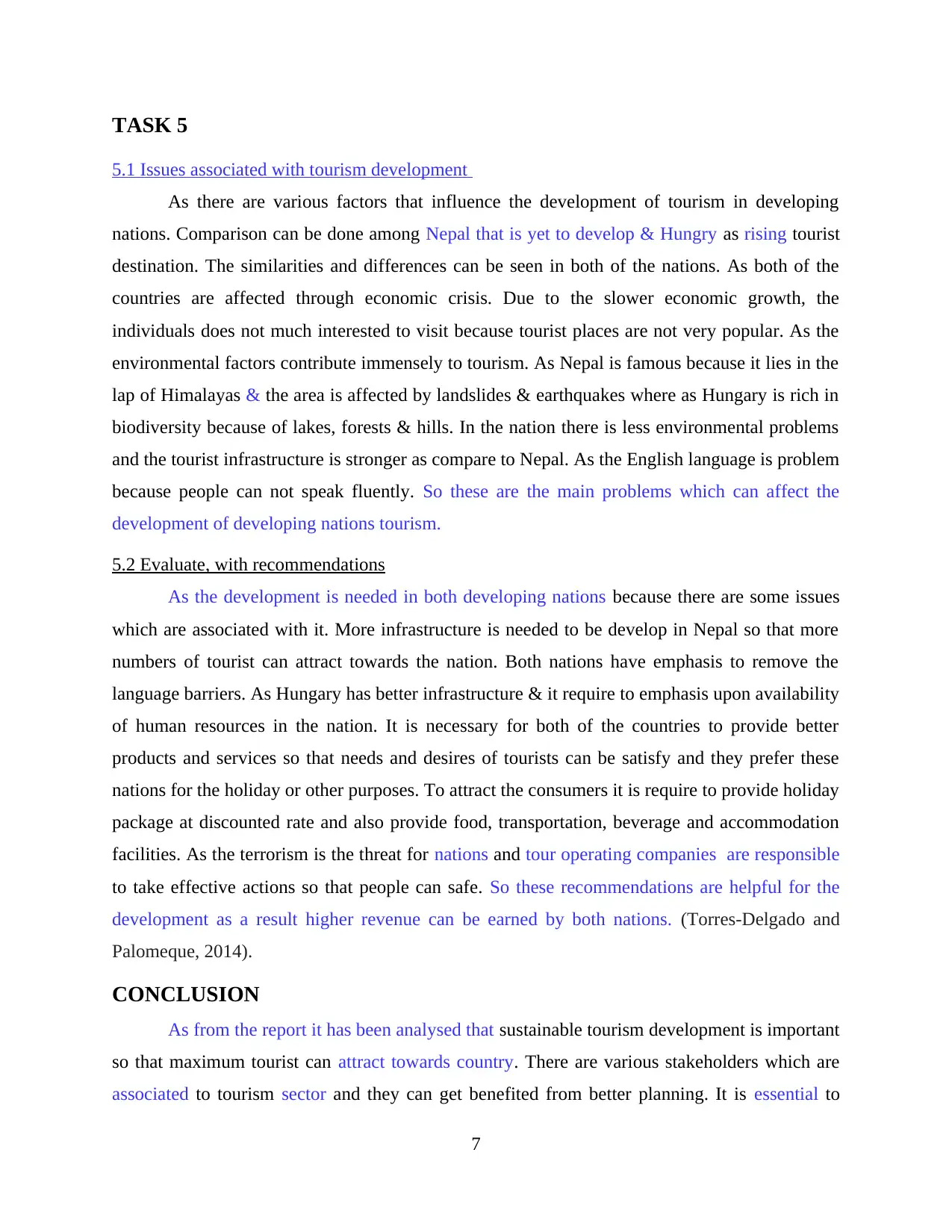
TASK 5
5.1 Issues associated with tourism development
As there are various factors that influence the development of tourism in developing
nations. Comparison can be done among Nepal that is yet to develop & Hungry as rising tourist
destination. The similarities and differences can be seen in both of the nations. As both of the
countries are affected through economic crisis. Due to the slower economic growth, the
individuals does not much interested to visit because tourist places are not very popular. As the
environmental factors contribute immensely to tourism. As Nepal is famous because it lies in the
lap of Himalayas & the area is affected by landslides & earthquakes where as Hungary is rich in
biodiversity because of lakes, forests & hills. In the nation there is less environmental problems
and the tourist infrastructure is stronger as compare to Nepal. As the English language is problem
because people can not speak fluently. So these are the main problems which can affect the
development of developing nations tourism.
5.2 Evaluate, with recommendations
As the development is needed in both developing nations because there are some issues
which are associated with it. More infrastructure is needed to be develop in Nepal so that more
numbers of tourist can attract towards the nation. Both nations have emphasis to remove the
language barriers. As Hungary has better infrastructure & it require to emphasis upon availability
of human resources in the nation. It is necessary for both of the countries to provide better
products and services so that needs and desires of tourists can be satisfy and they prefer these
nations for the holiday or other purposes. To attract the consumers it is require to provide holiday
package at discounted rate and also provide food, transportation, beverage and accommodation
facilities. As the terrorism is the threat for nations and tour operating companies are responsible
to take effective actions so that people can safe. So these recommendations are helpful for the
development as a result higher revenue can be earned by both nations. (Torres-Delgado and
Palomeque, 2014).
CONCLUSION
As from the report it has been analysed that sustainable tourism development is important
so that maximum tourist can attract towards country. There are various stakeholders which are
associated to tourism sector and they can get benefited from better planning. It is essential to
7
5.1 Issues associated with tourism development
As there are various factors that influence the development of tourism in developing
nations. Comparison can be done among Nepal that is yet to develop & Hungry as rising tourist
destination. The similarities and differences can be seen in both of the nations. As both of the
countries are affected through economic crisis. Due to the slower economic growth, the
individuals does not much interested to visit because tourist places are not very popular. As the
environmental factors contribute immensely to tourism. As Nepal is famous because it lies in the
lap of Himalayas & the area is affected by landslides & earthquakes where as Hungary is rich in
biodiversity because of lakes, forests & hills. In the nation there is less environmental problems
and the tourist infrastructure is stronger as compare to Nepal. As the English language is problem
because people can not speak fluently. So these are the main problems which can affect the
development of developing nations tourism.
5.2 Evaluate, with recommendations
As the development is needed in both developing nations because there are some issues
which are associated with it. More infrastructure is needed to be develop in Nepal so that more
numbers of tourist can attract towards the nation. Both nations have emphasis to remove the
language barriers. As Hungary has better infrastructure & it require to emphasis upon availability
of human resources in the nation. It is necessary for both of the countries to provide better
products and services so that needs and desires of tourists can be satisfy and they prefer these
nations for the holiday or other purposes. To attract the consumers it is require to provide holiday
package at discounted rate and also provide food, transportation, beverage and accommodation
facilities. As the terrorism is the threat for nations and tour operating companies are responsible
to take effective actions so that people can safe. So these recommendations are helpful for the
development as a result higher revenue can be earned by both nations. (Torres-Delgado and
Palomeque, 2014).
CONCLUSION
As from the report it has been analysed that sustainable tourism development is important
so that maximum tourist can attract towards country. There are various stakeholders which are
associated to tourism sector and they can get benefited from better planning. It is essential to
7

develop interactive planning systems & processes in tourism development. To resolve the
conflicts are necessary for sustainable tourism development. Issues that are associated with
tourism development are needed to be resolve. As the recommendations are beneficial for the
further improvement in both destinations. It is required for tour operators to fulfil the
expectations of people by proving quality products & services.
8
conflicts are necessary for sustainable tourism development. Issues that are associated with
tourism development are needed to be resolve. As the recommendations are beneficial for the
further improvement in both destinations. It is required for tour operators to fulfil the
expectations of people by proving quality products & services.
8
Secure Best Marks with AI Grader
Need help grading? Try our AI Grader for instant feedback on your assignments.
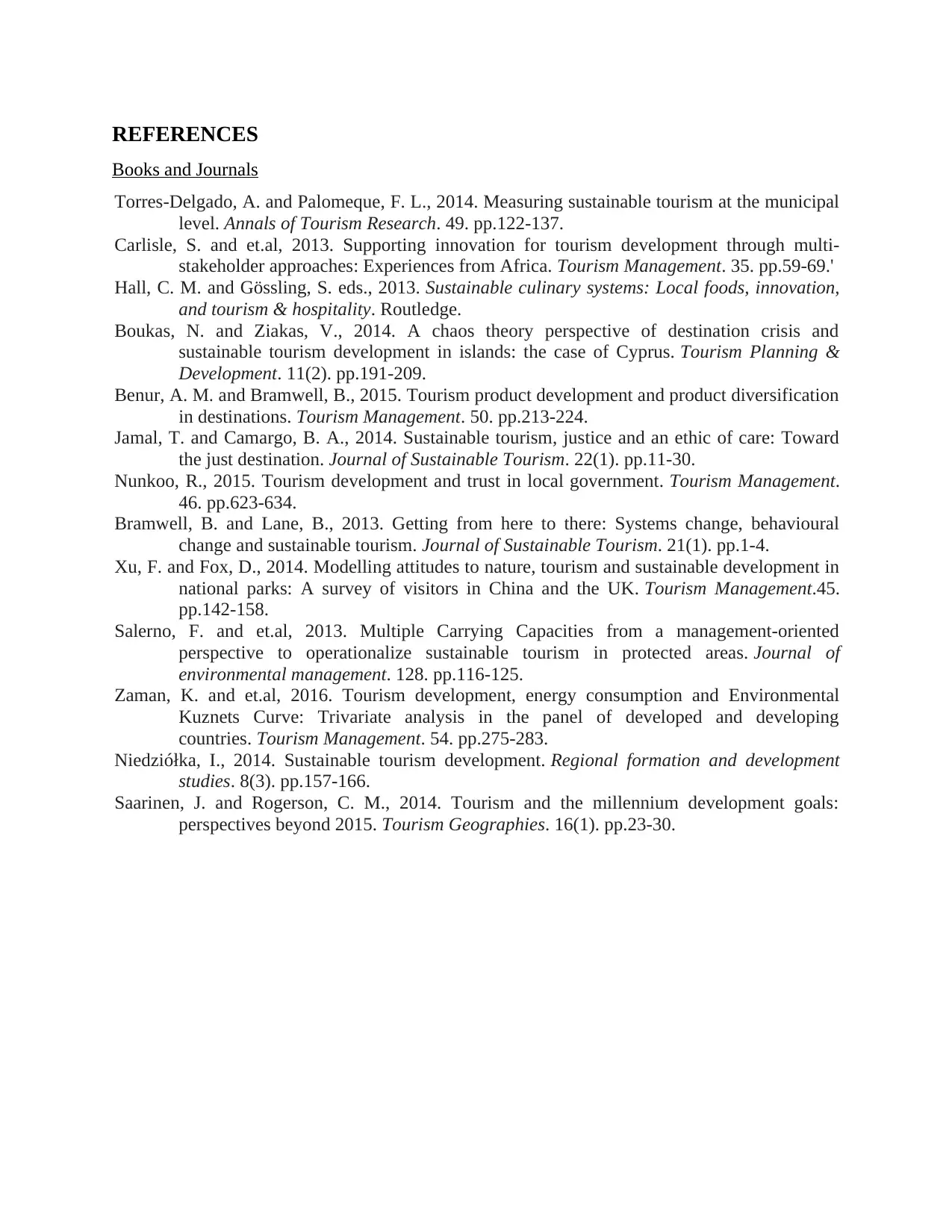
REFERENCES
Books and Journals
Torres-Delgado, A. and Palomeque, F. L., 2014. Measuring sustainable tourism at the municipal
level. Annals of Tourism Research. 49. pp.122-137.
Carlisle, S. and et.al, 2013. Supporting innovation for tourism development through multi-
stakeholder approaches: Experiences from Africa. Tourism Management. 35. pp.59-69.'
Hall, C. M. and Gössling, S. eds., 2013. Sustainable culinary systems: Local foods, innovation,
and tourism & hospitality. Routledge.
Boukas, N. and Ziakas, V., 2014. A chaos theory perspective of destination crisis and
sustainable tourism development in islands: the case of Cyprus. Tourism Planning &
Development. 11(2). pp.191-209.
Benur, A. M. and Bramwell, B., 2015. Tourism product development and product diversification
in destinations. Tourism Management. 50. pp.213-224.
Jamal, T. and Camargo, B. A., 2014. Sustainable tourism, justice and an ethic of care: Toward
the just destination. Journal of Sustainable Tourism. 22(1). pp.11-30.
Nunkoo, R., 2015. Tourism development and trust in local government. Tourism Management.
46. pp.623-634.
Bramwell, B. and Lane, B., 2013. Getting from here to there: Systems change, behavioural
change and sustainable tourism. Journal of Sustainable Tourism. 21(1). pp.1-4.
Xu, F. and Fox, D., 2014. Modelling attitudes to nature, tourism and sustainable development in
national parks: A survey of visitors in China and the UK. Tourism Management.45.
pp.142-158.
Salerno, F. and et.al, 2013. Multiple Carrying Capacities from a management-oriented
perspective to operationalize sustainable tourism in protected areas. Journal of
environmental management. 128. pp.116-125.
Zaman, K. and et.al, 2016. Tourism development, energy consumption and Environmental
Kuznets Curve: Trivariate analysis in the panel of developed and developing
countries. Tourism Management. 54. pp.275-283.
Niedziółka, I., 2014. Sustainable tourism development. Regional formation and development
studies. 8(3). pp.157-166.
Saarinen, J. and Rogerson, C. M., 2014. Tourism and the millennium development goals:
perspectives beyond 2015. Tourism Geographies. 16(1). pp.23-30.
Books and Journals
Torres-Delgado, A. and Palomeque, F. L., 2014. Measuring sustainable tourism at the municipal
level. Annals of Tourism Research. 49. pp.122-137.
Carlisle, S. and et.al, 2013. Supporting innovation for tourism development through multi-
stakeholder approaches: Experiences from Africa. Tourism Management. 35. pp.59-69.'
Hall, C. M. and Gössling, S. eds., 2013. Sustainable culinary systems: Local foods, innovation,
and tourism & hospitality. Routledge.
Boukas, N. and Ziakas, V., 2014. A chaos theory perspective of destination crisis and
sustainable tourism development in islands: the case of Cyprus. Tourism Planning &
Development. 11(2). pp.191-209.
Benur, A. M. and Bramwell, B., 2015. Tourism product development and product diversification
in destinations. Tourism Management. 50. pp.213-224.
Jamal, T. and Camargo, B. A., 2014. Sustainable tourism, justice and an ethic of care: Toward
the just destination. Journal of Sustainable Tourism. 22(1). pp.11-30.
Nunkoo, R., 2015. Tourism development and trust in local government. Tourism Management.
46. pp.623-634.
Bramwell, B. and Lane, B., 2013. Getting from here to there: Systems change, behavioural
change and sustainable tourism. Journal of Sustainable Tourism. 21(1). pp.1-4.
Xu, F. and Fox, D., 2014. Modelling attitudes to nature, tourism and sustainable development in
national parks: A survey of visitors in China and the UK. Tourism Management.45.
pp.142-158.
Salerno, F. and et.al, 2013. Multiple Carrying Capacities from a management-oriented
perspective to operationalize sustainable tourism in protected areas. Journal of
environmental management. 128. pp.116-125.
Zaman, K. and et.al, 2016. Tourism development, energy consumption and Environmental
Kuznets Curve: Trivariate analysis in the panel of developed and developing
countries. Tourism Management. 54. pp.275-283.
Niedziółka, I., 2014. Sustainable tourism development. Regional formation and development
studies. 8(3). pp.157-166.
Saarinen, J. and Rogerson, C. M., 2014. Tourism and the millennium development goals:
perspectives beyond 2015. Tourism Geographies. 16(1). pp.23-30.

2
1 out of 12
Related Documents
Your All-in-One AI-Powered Toolkit for Academic Success.
+13062052269
info@desklib.com
Available 24*7 on WhatsApp / Email
![[object Object]](/_next/static/media/star-bottom.7253800d.svg)
Unlock your academic potential
© 2024 | Zucol Services PVT LTD | All rights reserved.

![[SOLVED] Sustainable Tourism Development](/_next/image/?url=https%3A%2F%2Fdesklib.com%2Fmedia%2Fimages%2Ffb%2F6fa7f8fc6b62400f9bac8296b21c11a9.jpg&w=256&q=75)



